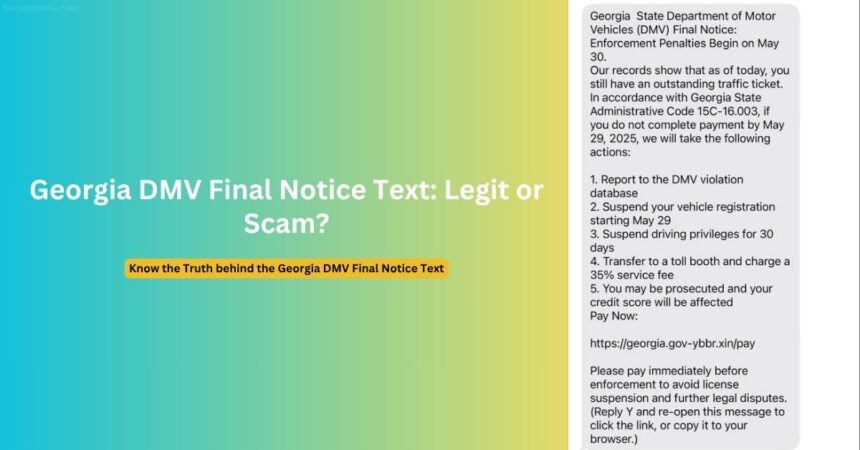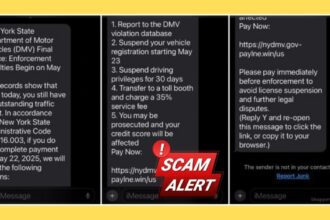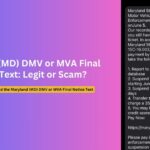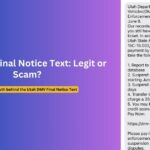Breaking Alert: The Georgia Bureau of Investigation and Georgia Department of Driver Services have issued urgent warnings about a sophisticated Georgia DMV Final Notice Text Scam targeting residents statewide. These fraudulent messages claim to be from the “Georgia State Department of Motor Vehicles” demanding immediate payment for supposed outstanding traffic tickets.
This coordinated phishing attack has affected thousands of Georgia residents across all major cities and counties, with scammers using official-sounding language and fake legal codes to create panic and steal personal information. The Georgia DDS Commissioner Angelique B. McClendon has confirmed these messages are completely fraudulent and designed to obtain money and personal data from unsuspecting victims.
Overview of the Georgia DMV Outstanding Traffic Tickets Text Scam
The Georgia State Department of Motor Vehicles Outstanding Traffic Ticket Text scam represents one of the most widespread “smishing” (SMS phishing) campaigns targeting Georgia residents in recent years. Scammers are mass-distributing text messages that falsely claim to be from Georgia’s motor vehicle department, threatening immediate license suspension for alleged unpaid traffic violations.
What makes this scam particularly dangerous is its professional appearance and use of specific Georgia references, including fake administrative codes and official-sounding terminology. The messages create artificial urgency by threatening severe consequences within 24-48 hours, pressuring recipients to act quickly without taking time to verify the legitimacy of the claims.
The Georgia Department of Driver Services (DDS) has emphasized that they never contact customers via unsolicited text messages requesting payment or personal information. All legitimate DDS communications regarding license issues, violations, or payments are sent through official postal mail or through verified DDS online accounts.
This scam is part of a coordinated nationwide campaign affecting multiple states, with scammers adapting the same basic template for different state motor vehicle departments while targeting residents based on area codes and phone number databases.
How the Georgia State Department of Motor Vehicles Final Notice Text Scam Operates
The Georgia DMV scam follows a sophisticated multi-phase approach designed to maximize victim compliance and data theft:
Phase 1: Mass Text Distribution
Scammers use automated systems to send thousands of identical messages to Georgia phone numbers, particularly targeting area codes 229, 404, 470, 478, 678, 706, 762, and 912. They obtain these numbers through various methods including data breaches, purchased marketing lists, and social media harvesting.
Phase 2: Fear and Urgency Creation
The fraudulent messages create immediate panic by threatening severe consequences including license suspension, vehicle registration cancellation, credit score damage, and legal prosecution. By setting extremely tight deadlines (often 24-48 hours), scammers pressure victims to act without taking time for verification.
Phase 3: Fake Authority Establishment
The messages use official-sounding language, reference fake Georgia administrative codes, and claim to be from government agencies to establish credibility. They exploit people’s natural respect for government authority and fear of legal consequences.
Phase 4: Information and Financial Harvesting
When victims click the malicious links, they’re directed to sophisticated fake websites designed to steal personal information including Social Security numbers, driver’s license details, banking information, and credit card data.
Phase 5: Continued Exploitation
Once scammers obtain personal information, they can continue targeting victims with additional scams, sell the data on criminal marketplaces, or use it for identity theft and unauthorized financial transactions.
Fake Text Message Patterns and Examples
Standard Fake Georgia DMV Text Format
Example 1: Typical Final Notice Message
Georgia State Department of Motor Vehicles (DMV) Final Notice:
Enforcement Penalties Begin on May 30.
Our records show that as of today, you still have an outstanding traffic ticket. In accordance with Georgia State Administrative Code 15C-16.003, if you do not complete payment by May 29, 2025, we will take the following actions:
1. Report to the DMV violation database
2. Suspend your vehicle registration starting May 29
3. Suspend driving privileges for 30 days
4. Transfer to a toll booth and charge a 35% service fee
5. You may be prosecuted and your credit score will be affected Pay Now:
https://georgia.gov-ybbr.xin/pay
Please pay immediately before enforcement to avoid license suspension and further legal disputes. (Reply Y and re-open this message to click the link, or copy it to your browser.)
Example 2: Urgent Payment Demand Variation
URGENT: Georgia DDS Final Notice
Your driving privileges will be SUSPENDED in 24 hours due to unpaid violation #GA2025-9847.
Immediate payment required: https://dds-georgia-payment.net/settle
Failure to pay will result in license revocation and additional penalties.
Example 3: Peach Pass Related Scam
Georgia State Road & Tollway Authority Notice:
Outstanding Peach Pass toll charges detected on your account.
Pay within 12 hours to avoid:
– $200 penalty assessment
– License suspension
– Vehicle registration hold
Secure payment: https://peachpass-georgia.com/emergency-payment
Common Variations and Adaptations
Scammers frequently modify their messages to avoid detection and increase effectiveness. Variations include different deadline dates, varying penalty amounts, alternative fake website URLs, and different sender identification methods including email addresses and international phone numbers.
Critical Red Flags to Identify Fraudulent Georgia DMV Texts
Sender Identification Red Flags
- International phone numbers: Messages from +63 (Philippines), +44 (UK), or other non-US country codes
- Email addresses: Texts originating from Gmail, Outlook, Yahoo, or other personal email services
- Unusual number patterns: Phone numbers that don’t match standard US formatting or Georgia area codes
Content and Language Red Flags
- Wrong agency name: Using “Department of Motor Vehicles (DMV)” instead of “Department of Driver Services (DDS)”
- Fake legal references: Citation of non-existent “Georgia State Administrative Code 15C-16.003”
- Grammar and spelling errors: Poor sentence structure, missing punctuation, or obvious typos
- Generic messaging: Lack of specific personal details, violation numbers, or actual incident dates
- Impossible enforcement actions: References to “toll booth transfers” or other nonsensical procedures
Technical Red Flags
- Suspicious URLs: Links not ending in “.gov” or containing extra characters, hyphens, or unusual extensions
- Link activation requirements: Instructions to “Reply Y and re-open” indicating scammer tactics
- Shortened links: Use of bit.ly, tinyurl, or other URL shortening services
- Non-HTTPS websites: Lack of secure connection indicators on payment pages
Communication Method Red Flags
- Text message delivery: Legitimate DDS communications always come via postal mail
- Immediate payment demands: Real government notices provide extended timeframes and multiple warnings
- Urgent deadline pressure: Artificial time constraints designed to prevent verification
- No customer service options: Lack of legitimate contact information for questions or verification
Statewide Scam Campaign Targeting All Georgia Cities
Atlanta Metropolitan Area Under Attack
Residents throughout the Atlanta metro area including Atlanta, Sandy Springs, Roswell, Johns Creek, Alpharetta, Marietta, Smyrna, Dunwoody, Brookhaven, Peachtree Corners, and Decatur are experiencing high volumes of these Georgia DMV Final Notice Text Scam messages.
Augusta and Eastern Georgia Affected
The scam has heavily targeted Augusta, Richmond County, Columbia County, and surrounding areas including Evans, Martinez, Grovetown, and Harlem, with particular focus on commuters who regularly use toll roads.
Savannah and Coastal Georgia Hit Hard
Savannah residents along with those in Pooler, Richmond Hill, Tybee Island, Hinesville, and throughout Chatham County are receiving numerous fraudulent Georgia State Department of Motor Vehicles Outstanding Traffic Ticket Text messages.
Columbus and West Central Georgia Targeted
Columbus, Phenix City area residents, and those in Muscogee County, Harris County, and Chattahoochee County are being specifically targeted by scammers exploiting the region’s military population.
Macon and Central Georgia Under Siege
Macon, Warner Robins, Milledgeville, and surrounding Bibb County, Houston County, and Baldwin County residents are receiving coordinated waves of these fraudulent DDS text messages.
Athens and North Georgia Victims
University of Georgia students and Athens-Clarke County residents, along with those in Commerce, Gainesville, Dahlonega, and surrounding areas are prime targets for this sophisticated scam operation.
Albany and Southwest Georgia Affected
Albany, Tifton, Valdosta, and residents throughout Dougherty County, Tift County, and Lowndes County are experiencing significant scam activity targeting agricultural and business communities.
Statewide Rural Community Targeting
Smaller communities including Rome, Dalton, LaGrange, Thomasville, Waycross, Brunswick, Fitzgerald, and Dublin are not immune, with scammers specifically targeting rural residents who may be less familiar with digital security practices.
How to Protect Yourself from These DMV Text Scams
Immediate Response Protocol
- Never click suspicious links in text messages claiming to be from government agencies
- Do not reply to the message, even with “STOP” or denial responses
- Do not call any phone numbers provided in suspicious texts
- Take screenshots of the message for reporting and evidence purposes
- Block the sender immediately through your phone’s messaging system
Verification and Authentication Steps
- Use official DDS website only: Visit dds.ga.gov directly, never through text links
- Log into DDS Online Services: Check dds.drives.ga.gov for legitimate account information
- Call DDS directly: Use verified phone numbers from the official website
- Review official mail: Check for legitimate postal correspondence from DDS
- Verify through multiple sources: Cross-reference any claims with official channels
Personal Security Measures
- Enable two-factor authentication on all government and financial accounts
- Use strong, unique passwords for DDS online services
- Monitor credit reports regularly for unauthorized activity
- Set up account alerts for unusual login attempts or changes
- Keep personal information private on social media platforms
Family and Community Protection
- Educate elderly family members about these specific scam tactics
- Share information with friends and community members
- Create verification protocols for urgent payment requests
- Establish communication procedures for reporting suspicious messages within families
What to Do If You Receive a Fake Georgia State Department of Motor Vehicles Text
Immediate Actions Required
- Document the scam: Take clear screenshots of the entire message including sender information
- Block the number: Prevent future messages from the same source
- Report as spam: Forward the message to 7726 (SPAM) to notify your carrier
- Delete the message: Remove it after proper documentation
Official Reporting Procedures
- Georgia Bureau of Investigation: Report the scam through their official fraud reporting channels
- Georgia Department of Driver Services: Contact DDS fraud prevention department
- Federal Trade Commission: File detailed complaints at reportfraud.ftc.gov
- Internet Crime Complaint Center: Submit reports to ic3.gov for federal investigation
- Georgia Attorney General: Report through the Consumer Protection Division
If You Already Clicked the Link
- Immediately change passwords for all financial and government accounts
- Contact your bank to report potential fraudulent activity
- Run comprehensive security scans on all devices used
- Monitor all accounts for unauthorized access or transactions
- Consider identity monitoring services for ongoing protection
If You Provided Personal Information
- Contact financial institutions immediately to secure accounts and request new cards
- Place fraud alerts on all credit reports with major bureaus
- File identity theft reports with local law enforcement
- Consider credit freezes to prevent new account openings
- Document all communications with financial institutions and law enforcement
Frequently Asked Questions (FAQs)
1. Is the Georgia DMV Final Notice Outstanding Traffic Ticket Text Legit?
No, these text messages are completely fraudulent. The Georgia Department of Driver Services (DDS) does not send payment notices, violation warnings, or any official communications via text message. All legitimate DDS communications regarding traffic violations, license issues, or payment requirements are sent through official postal mail with Georgia state letterhead or through verified DDS online account portals. Any text message claiming to be from the “Georgia State Department of Motor Vehicles” is automatically suspicious since Georgia uses “DDS” (Department of Driver Services) as their official designation, not “DMV.”
2. Does the Georgia Administrative Code 15C-16.003 Actually Exist?
No, Georgia State Administrative Code 15C-16.003 is completely fictitious and does not exist in Georgia’s legal framework. Scammers created this fake legal reference to make their fraudulent messages appear more official and credible. Real Georgia administrative codes follow different numbering systems and can be verified through the Georgia Secretary of State’s official website. The use of non-existent legal codes is a common tactic used by scammers to intimidate victims and create false authority for their demands.
3. Does Georgia DDS Send Text Messages for Any Official Business?
The Georgia Department of Driver Services does not send unsolicited text messages for any official business, including payment notifications, violation alerts, license renewals, or enforcement actions. DDS Commissioner Angelique B. McClendon has explicitly stated that “DDS employees do not contact customers to ask for payment or other confidential information” via text message. All legitimate DDS communications are conducted through official postal mail, verified online accounts at dds.drives.ga.gov, or in-person visits to DDS locations.
4. What Should I Do if I Already Paid Money Through a Georgia DMV Scam Link?
If you’ve already made a payment through a fraudulent Georgia DMV scam link, take immediate action to minimize damage. Contact your bank or credit card company immediately to report the unauthorized transaction and request a chargeback or fraud investigation. Change all online banking and government account passwords immediately. Place fraud alerts on your credit reports with Equifax, Experian, and TransUnion. File reports with the Georgia Bureau of Investigation, Federal Trade Commission, and your local police department. Monitor all financial accounts closely for additional unauthorized activity and consider professional identity theft protection services.
5. How Do Scammers Get Georgia Phone Numbers for These Text Attacks?
Scammers obtain Georgia phone numbers through multiple methods including purchasing contact databases from marketing companies, exploiting data breaches from various businesses and organizations, using automated number generation systems targeting Georgia area codes (229, 404, 470, 478, 678, 706, 762, 912), harvesting numbers from social media profiles and public directories, and acquiring numbers from previous successful scam operations. They may also use specialized software to generate and test phone numbers systematically across Georgia’s telecommunications infrastructure.
Conclusion
The Georgia DMV Final Notice Text Scam represents a serious and escalating threat to residents across the Peach State. These sophisticated phishing attacks exploit our natural respect for government authority and fear of legal consequences to steal personal information and money. By understanding the warning signs, verification procedures, and proper response protocols outlined in this comprehensive guide, Georgia residents can effectively protect themselves and their families from becoming victims.
Remember that the legitimate Georgia Department of Driver Services will never contact you via unsolicited text messages demanding immediate payment or threatening instant license suspension. When receiving any suspicious government-related communications, always verify independently through official websites and phone numbers before taking any action.
The fight against these scams requires community awareness and vigilance. Share this information with family members, friends, and colleagues, particularly elderly relatives who may be especially vulnerable to these sophisticated fraud attempts. Report all suspicious messages to appropriate authorities to help law enforcement track and prosecute these criminal operations.
By staying informed about evolving scammer tactics and maintaining healthy skepticism about urgent payment demands, Georgia residents can significantly reduce their risk of falling victim to these fraudulent schemes. The key to defeating these scams lies in education, verification, and community cooperation.
Stay ahead of the latest scam alerts and consumer protection strategies with ShoppersVila.com – your trusted source for fraud prevention tips and financial security guidance to keep you and your family safe from emerging digital threats.









































